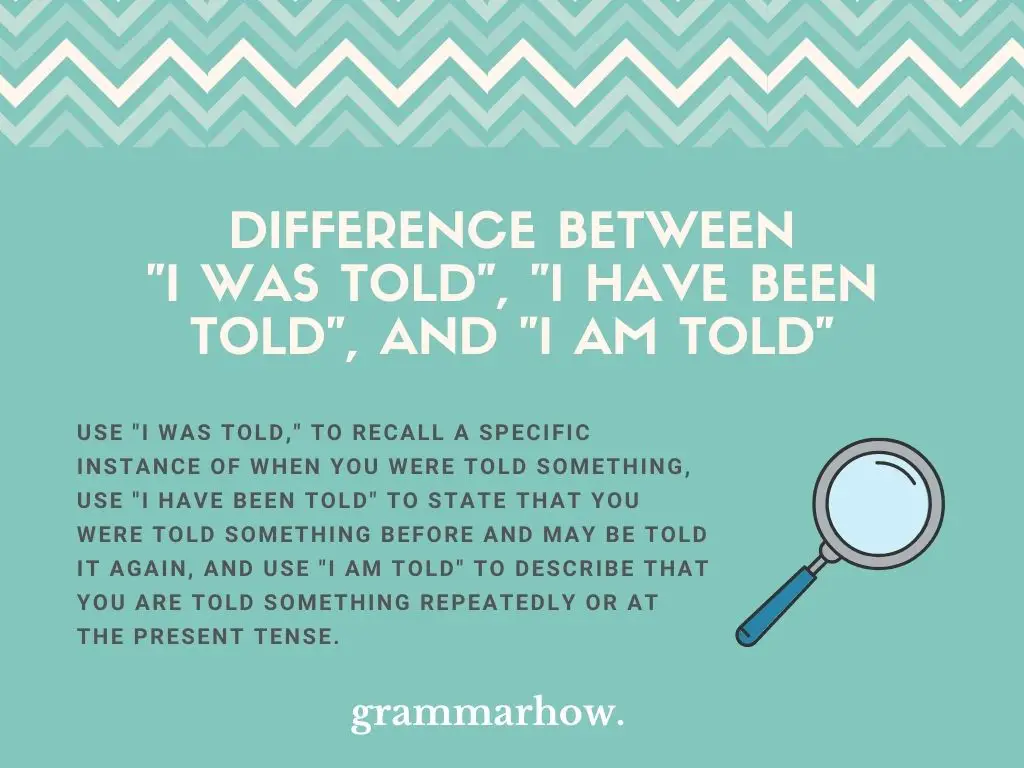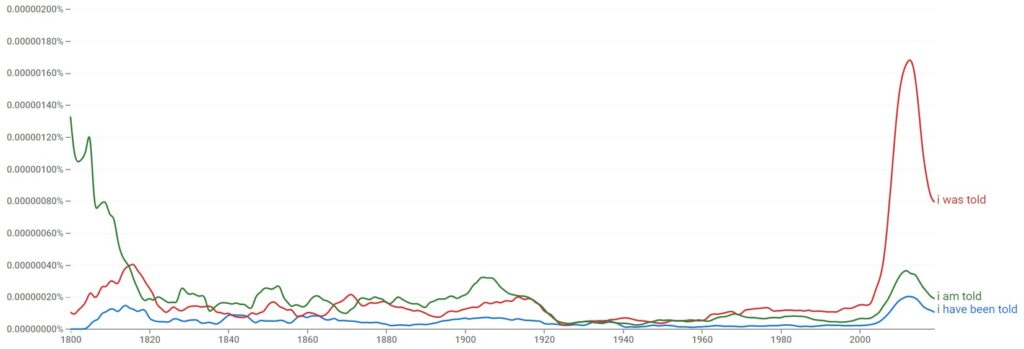The expressions “I was told,” “I have been told,” and “I am told,” may seem interchangeable at first glance. However, a closer look at the helping verbs of “was,” “have,” and “am,” reveals a different story. Here are the common problems with usage of these phrases and the proper time to choose each.
What Is The Difference Between “I Was Told”, “I Have Been Told”, And “I Am Told”?
Use “I was told,” to recall a specific instance of when you were told something, use “I have been told” to state that you were told something before and may be told it again, and use “I am told” to describe that you are told something repeatedly or at the present tense.

To further clarify, consider whether the word “told” is being used in the sentence as a past participle (perfect tense), present perfect progressive, or present simple tense.
- Past participle (perfect tense) indicates that an action has been completed at some point in the past.
- Present perfect progressive typically describes an action that started happening in the past and is continuing to occur in the present and may even occur in the future.
- Present simple is usually used when we talk about habits, actions occurring regularly, or actions occurring at the time of speaking.
�
Since the verb “told” doesn’t change it’s form in any of these instances, it can be particularly confusing. Let’s look at these three phrases in more detail for an even better understanding.
What Does “I Was Told” Mean?
“I was told” is the past participle (perfect tense) of the phrase. It means that the “telling” was received by an individual at a time in the past. It also tends to imply that at that time of receiving the information, the individual made a decision whether or not they believed what was told.
Here are some examples of how you should properly use this phrase.
- I was told that I was wrong about the misunderstanding, and so I apologized for it.
- I was told that my grandparents came from Ireland and my mother was the first generation born here.
- I was told incorrect information by the company and lost a lot of money in the transaction.
Be very careful when using this form of the phrase that any other verbs that appear in the sentence also occur in the proper form of the past tense. See these examples of how the phrase could be used incorrectly.
- I was that I am wrong about the misunderstanding and will apologize for it.
- I was told that my grandparents come from Ireland and my mother is the first generation born here.
- I was told incorrect information by the company and will lose a lot of money in the transaction.
Notice that in the sentences that show the expression used incorrectly, the other verb(s) in the sentence are in the “present” tense and do not agree with the past participle expression “I was.”
What Does “I Have Been Told” Mean?
“I have been told” is the present perfect progressive tense and tells the audience that the action has happened in the past (maybe many times), continues to happen in the present, and may happen again in the future.
A typical guideline for the present perfect progressive tense is that it follows the formula of subject + has/have + been + verb-ing + object, However, as you can see in our example phrase, the verb “told” does not end in “ing.”
Therefore, some instances do exist where the phrase “have been” does not have an “ing” verb following it. You should make sure to look at the intent of your message when deciding to use this form.
Let’s look a little closer with these examples.
- I have been told that I’m a good writer, but I still get nervous when it’s time to turn in a big essay.
- I have been told that the new restaurant in town is good, but I haven’t gotten a chance to try it out yet.
- I have been told that it is difficult to make the hockey team, yet I still plan on trying out.
Note that in these examples, the speaker does not indicate how often or for how long they “have been told” the topic, but we know that it has started at some point in the past, might be continuing at the current time, and may even continue into the future.
What Does “I Am Told” Mean?
“I am told” is the present simple tense of the phrase. You would use this option if you want to indicate that whatever you are being told is done regularly or even occurring at the time that you are speaking it. It describes a relatively simple time relation.
Typically when you use this phrase, it suggests that the name or identity of the person who told you the information is not important or that it may have been told to you by numerous people.
Look at the following sentences to see how this works.
- I am told that I need to brush my teeth every night to avoid cavities.
- I am told that dinner is coming soon but won’t believe it until it is here.
- I am told that the best route to get to school is to take the expressway, but I still prefer to drive the secondary roads.
Notice in the first and third example above that the phrase “I am told” indicates something that the speaker is told on a regular basis. We don’t know exactly who is telling them this information, but they are hearing it more than once.
In the second example, “I am told” indicates that the fact that “dinner is coming out soon,” is being told to the speaker at the exact time that he or she is actively waiting for it to arrive.
Is “I Was Told”, “I Have Been Told”, Or “I Am Told” Used The Most?
It is interesting to look at this Google Ngram Viewer and see the patterns for how often you will find each of these phrases used throughout history up to the present day. The graph indicates that for much of history there is only a slight variation in the frequency of use.

From 1800 up until about 1810, the phrase “I am told” had a stronger prevalence than the other two phrases. Around 1810, it’s usage started to drop and by about 1814 it had leveled out with the other two phrases.
The three phrases remained constant in the overlapping of their popularity until about the year 2002. At that time, the phrase “I was told” showed a spike in use.
The popularity of “I was told” peaked in the year 2012, and has since been declining, although it has not yet leveled out again with the other two phrases.
When Should I Use “I Had Been Told”?
You should use the variation “I had been told” when you are speaking in the past perfect tense. It indicates that you are the receiver of the action (in this case told) and that the “telling” occurred in the past.
This variation is different from the use of “have been told,” because it means that the action both occurred in the past and ended in the past (is not continuing).
The past perfect tense is made up of the helping verb “had” and a past participle tense “told.” It can also include an indicator of a duration of time or specific frequency.
Let’s look at some examples.
- I had been told many times when I was a teenager that one should never stay out past midnight.
- I had been told once by my grandmother that she had wanted to be a teacher since she was very little.
- Before the event started, I had been told by many other people that the speaker would be excellent.
See how these examples show that the telling started and happened in the past.
Is It Correct To Use “I Am Being Told”?
“I am being told” is not technically an incorrect variation. However, it indicates passive voice. Many writing instructors and professors look down upon writing done in the passive voice. As a general rule, if you can get your message across using another version of the phrase, it would be preferred.
Passive voice indicates that an action is “being done” to the subject, rather than the subject actively participating in the action which can sometimes make the sentence sound awkward.
Let’s look at some examples of “I am being told” used in a sentence, and see how switching to the active voice makes the sentence more readable.
- Passive Voice: I am being told by the facilitator that the presentation will start in about 15 minutes.
- Active Voice: I am told by the facilitator that the presentation will start in about 15 minutes.
- Passive Voice: I am being told by my boyfriend that he will be late to pick me up again.
- Active Voice: My boyfriend has told me that he will be late picking me up again.
- Passive Voice: I am being told by my mother that I will be in trouble if I stay out past my curfew.
- Active Voice: My mother has told me that I will be in trouble if I stay out past my curfew.
See how the passive voice gets the core message across, but the active voice makes it much more pleasant to read and easier to understand.

Martin holds a Master’s degree in Finance and International Business. He has six years of experience in professional communication with clients, executives, and colleagues. Furthermore, he has teaching experience from Aarhus University. Martin has been featured as an expert in communication and teaching on Forbes and Shopify. Read more about Martin here.
